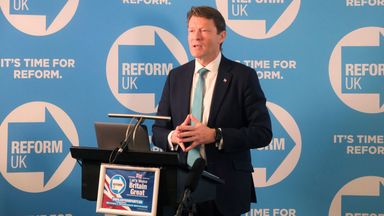Evaluating Reform UK's Agricultural Policies

Table of Contents
Reform UK's Stance on Subsidies and Support for Farmers
Reform UK's proposed changes to agricultural subsidies represent a significant departure from current policies. While specifics may vary depending on evolving party platforms, a common thread often involves reducing reliance on direct payments and shifting towards a more market-oriented approach. This could mean:
- Reduced direct payments: A decrease in the level of direct subsidies to farmers, aiming to promote efficiency and competitiveness.
- Targeted support for specific sectors: Focusing subsidies on particular agricultural sectors deemed crucial for national food security or environmental sustainability.
- Emphasis on innovation and technology: Providing support for farmers adopting sustainable technologies and practices to enhance productivity and resilience.
The impact of such changes could vary significantly across different farm types. Large-scale, highly efficient farms might be relatively unaffected or even benefit from reduced competition. However, small-scale, less efficient farms could face considerable challenges, potentially leading to farm closures and consolidation within the sector. The implications for food prices and food security are complex and require further analysis, considering potential impacts on production volumes and supply chain stability. A reduction in subsidies might drive up food prices, particularly for domestically produced goods.
Environmental Considerations in Reform UK's Agricultural Policies
Reform UK's approach to environmental protection in agriculture is another key area requiring scrutiny. While specific proposals may evolve, a general emphasis on promoting environmentally friendly farming practices is often advocated. This may include:
- Promoting sustainable farming techniques: Encouraging practices like agroforestry, no-till farming, and integrated pest management to minimize environmental impact.
- Incentivizing carbon sequestration: Rewarding farmers for practices that help capture and store carbon in the soil, contributing to climate change mitigation.
- Protecting biodiversity: Implementing policies to safeguard habitats and support biodiversity within agricultural landscapes.
However, potential conflicts between agricultural production and environmental goals remain a concern. Balancing the need to increase food production with the need to protect the environment requires careful consideration. The effectiveness of Reform UK's proposed environmental measures needs rigorous assessment to ensure they meet international environmental targets and contribute meaningfully to biodiversity conservation and climate change mitigation. A thorough examination of their alignment with existing environmental regulations and international agreements like the Paris Agreement is necessary.
Impact on the Rural Economy and Rural Communities under Reform UK's Policies
Reform UK's agricultural policies will undoubtedly have significant consequences for rural economies and communities. The potential impacts on employment, infrastructure, and community development need careful evaluation. A reduction in subsidies, for example, could lead to:
- Job losses: Farm closures and reduced agricultural activity could result in job losses in rural areas.
- Reduced investment in rural infrastructure: Lower farm incomes may reduce the capacity for investment in local infrastructure, impacting services and amenities.
- Increased rural depopulation: Economic hardship in rural areas could lead to out-migration, further weakening communities.
However, a market-oriented approach could also stimulate innovation and create new opportunities in rural areas. This requires carefully designed support mechanisms to facilitate diversification and ensure the economic viability of rural communities. Comparing the potential impacts of Reform UK's proposals with those of other political parties is essential to provide a comprehensive assessment of their potential effects on rural well-being.
Trade and Global Implications of Reform UK's Agricultural Approach
Reform UK's stance on agricultural trade and its global implications require thorough analysis. Their position on trade agreements, agricultural imports, and exports will significantly affect UK farmers' competitiveness in international markets and consumer access to diverse food products. Key aspects to consider include:
- Post-Brexit trade agreements: The impact of Reform UK's policies on the UK's ability to secure favorable trade deals with other countries.
- Impact on food prices: How trade policies will affect the prices of both imported and domestically produced food.
- Consumer choice: The extent to which Reform UK's policies will influence consumer access to a variety of food products.
A complete evaluation necessitates assessing potential trade barriers or benefits arising from their policies. Analyzing the impact on the competitiveness of UK farmers in global markets and their capacity to adapt to potential changes is crucial.
Conclusion: A Critical Assessment of Reform UK's Agricultural Policies
This analysis highlights the complexity of evaluating Reform UK's agricultural policies. While a market-oriented approach might foster innovation and efficiency in certain sectors, it could also negatively affect smaller farms and rural communities. The potential trade-offs between economic efficiency, environmental sustainability, and social equity require careful consideration. A well-defined agricultural policy is critical for the UK's future, ensuring both food security and a thriving rural economy. The long-term consequences of implementing Reform UK's agricultural policies necessitate further research and public discussion. We encourage you to explore Reform UK's official website [link to Reform UK website], government reports on agricultural policy [link to relevant government report], and other credible sources to deepen your understanding and participate in informed discussions about the future of UK agriculture and farming policy. Engaging with these resources is vital for shaping a sustainable and prosperous future for UK agriculture and its vital role in food security.

Featured Posts
-
 Play Station Showcase Ps 5 Fans 2 Year Wait Reportedly Ends Soon
May 03, 2025
Play Station Showcase Ps 5 Fans 2 Year Wait Reportedly Ends Soon
May 03, 2025 -
 Poppys Family Issues Emotional Tribute Following Tragic Death
May 03, 2025
Poppys Family Issues Emotional Tribute Following Tragic Death
May 03, 2025 -
 El Suizo Fabio Christen Conquista La Vuelta A Murcia
May 03, 2025
El Suizo Fabio Christen Conquista La Vuelta A Murcia
May 03, 2025 -
 A Place In The Sun Top Locations For Overseas Property Investment
May 03, 2025
A Place In The Sun Top Locations For Overseas Property Investment
May 03, 2025 -
 Mo Salahs Future Contract Talks And Potential Jeopardy
May 03, 2025
Mo Salahs Future Contract Talks And Potential Jeopardy
May 03, 2025
